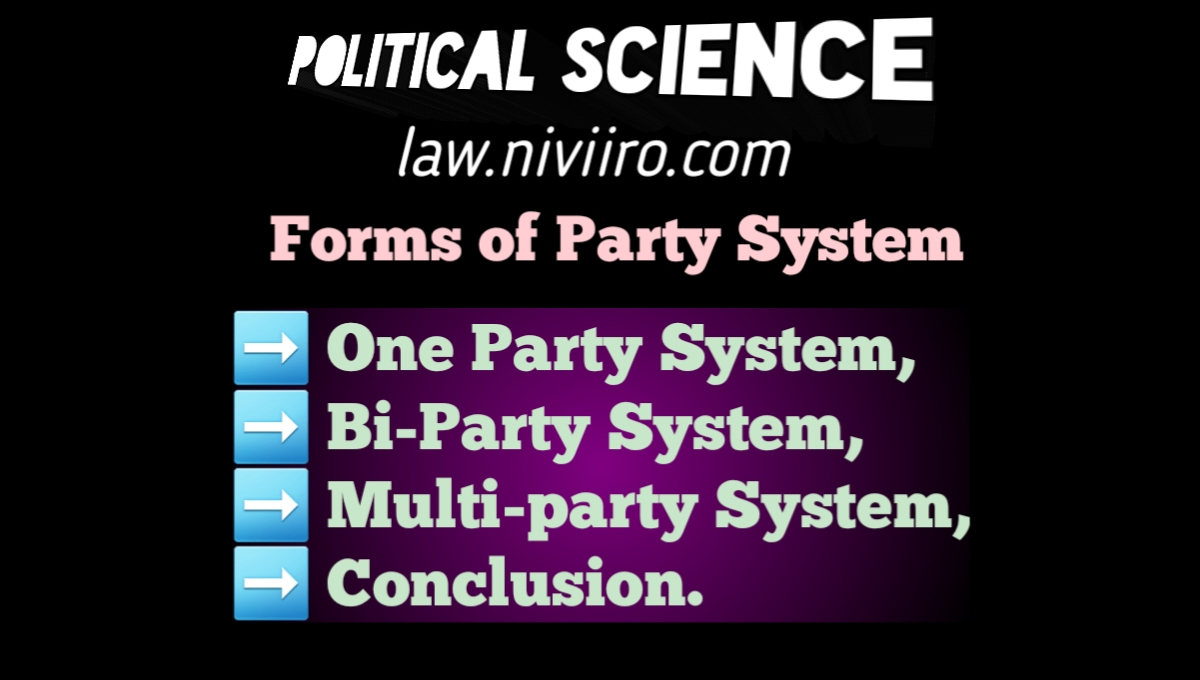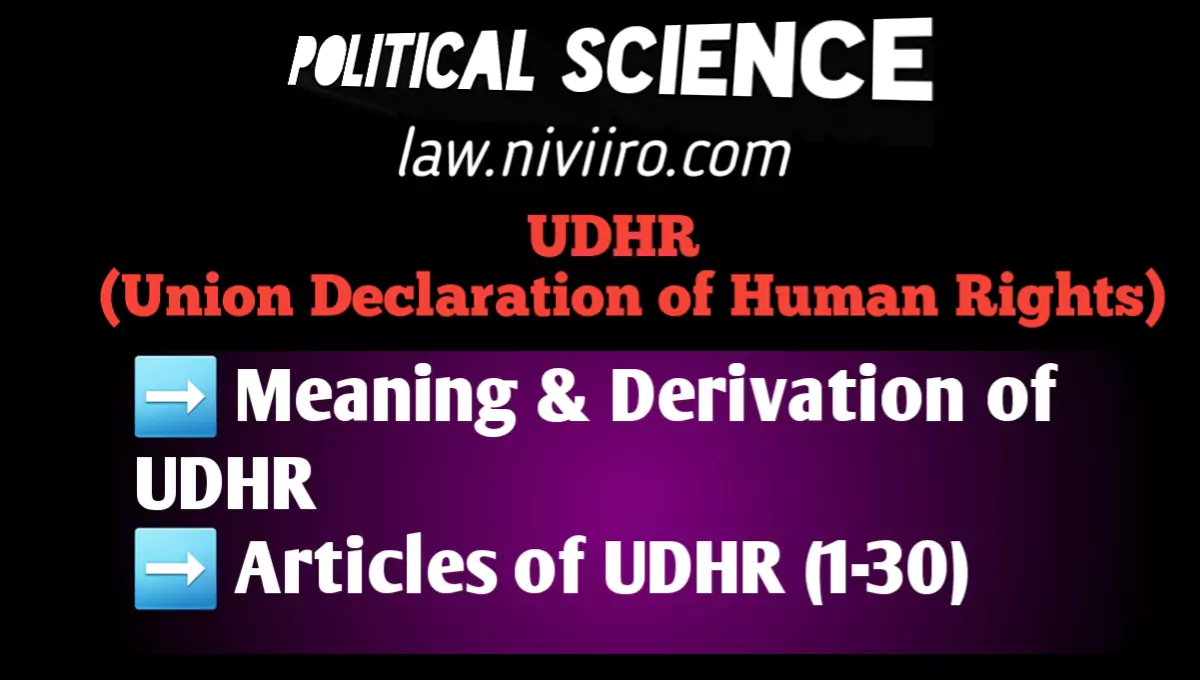Forms of Party Systems – There are various classifications of party systems based on different criteria. The commonly used criteria are: (1) number of parties within the system: (2) the structures ofparties within the system; and (3) the relative strengths of the political parties.
The traditional basis for the classification of party system has been the quantitative basis. Using this method of classification we can distinguish between the following party systems:
One Party System | Forms of Party Systems
It is also known as a single-party system. In such a system, political power is wielded by a single political party that is always in power. Other political parties or groupings can exist only with this party’s permission. It is referred to as a totalitarian one party system if this party does not allow any other party or organisation to exist or engage in opposition.
In the interwar years, the Fascist Party of Italy and the Nazi Party or National Socialist Party of Germany were totalitarian unitary political parties. The model of one party extended to other countries around the world. The similar experiment was carried out in Spain, Portugal, America, and a vast number of Central and East European states (including Yugoslavia, Albania, Bulgaria, Hungary, Poland, Romania, Czechoslovakia, and East Germany).After the second world war, it had its impression in Chìna also under the leadership of Mao. Other examples are the erstwhile Soviet Union, Egypt, Tanzania.
Merits of One-party System
1. Maintains national unity
The single party is a manifestation of national unity. Democratic pluralism scarifies the national interest in favour of private and sectional interests in the broken mirror of parties, causing the country to no longer recognise its own image. The single party protects national unity and approaches all challenges from a national perspective.
2. Efficient Administration
The administration becomes efficient when all of the authorities are consolidated in the hands of one leader and favouritism is used. Nepotism and black marketing are both outlawed.
3. Remarkable Economic Success
The country achieves remarkable economic progress when the government resolves disagreements among all classes and concentrates its complete efforts to increasing the country’s output.
4. Reflections People’s Social Unity
as defined by Marxists. The cach party is a manifestation of social class since a communist society has a distinct character, it is a “state of toilers,” and it must have only one political party. Only in a bourgeois country with diverse socioeconomic classes can separate political parties exist.
5. Establishes Stable Government
It aids in the establishment of stable administration, which aids in the country’s progress.
6. Long-term planning can be formed and carried out under this system. Under a one-party system, tremendous all-around improvement has been possible.
7. No time is wasted on useless criticism, propaganda debates, or scandals, and the administration functions well.
8. Establishment of Unity and Discipline
As the sole operation of a political system, there is unity and discipline in the country. The party’s authority is felt everywhere. The mandates of the party determine overall public policy. Every statement made by the parties is accepted as true. The party is the source of all laws, and no area of individual or social life is immune to its potential control. The leaders’ orders are undoubtedly followed by the rank and file; there is scarcely a dissident voice.
9. A single-party state is a “bearer of ideals,” an incarnation of faith: a moral or ethical system: “a new religion”; as such, it may act solely in defence. “The rise of the single party coincides with the rebirth of state religions in the new shape they have taken in the modern world: we have a religious state rather than state religions.”
Demerits of One-party System
1. Prevents the development of an individual’s personality
Such a system entails the destruction of freedom of speech, press, and association. As a result, the barrier between society and the state is blurred, and the latter totally consumes the former.
2. Lack of freedom of expression
The monopoly of legitimacy enjoyed by one party leaves the public with little alternative. The fundamental aspect of a democratic system is the opportunity for the electorate to choose amongst alternative options. A one-party state deprives electorates of their right to free choice by purposely eliminating all other competitions, implying the death of freedom and democracy.
3. A one-party state becomes totalitarian
As the single operator of a political system, a one-party state becomes necessarily totalitarian. The party’s authority is felt everywhere. The party’s directives determine overall public policy. Every statement made by the party is taken to be true. The party is the source of all laws, and no area of individual or social life is immune to its potential control.
4. It becomes authoritarian
The emphasis of a one party system is on the side of the totalitarian. It proclaims its own brand of philosophy and a peculiar way of life to which the noble society is forced to conform. The legislatures become mere facade. Oppositions are suppressed, and manifold social diversities are mechanically reduced to a unified pattern.
5. No Individual Liberty
There is no liberty for people. While democracies with two or more party systems promote individual liberty and the dignity of the human being, a one-party government tramples on human values.
6. A one-party dictatorship is predicated on brutality, strong nationalism, imperialism, and war.Ultimately the whole country suffers as it happened in Nazi Germany and Fascist Italy.
7. Undemocratic System
The existence of a single party is theoretically opposed to democracy. Because the core of democracy is openness to various points of view, a one-party state is inherently opposed to the democratic system. Every political party has its own unique view on the best way to govern. Allowing a single political party to exist inside the framework of the state means accepting the hegemony of a single political concept. A state with only one political party is always a one-sided state. Such dogmatism renders a one-party state undemocratic.
Bi-Party System or Two-Party System | Forms of Party Systems
A bi-party system has two major political parties that are roughly equally popular, or two major political parties with multiple minor or less powerful political parties. However, the two big ones continue to alternate in power.
The ruling party is one, while the opposing party is another. England and the United States of America are good examples of two-party systems. In England, there are currently two parties: the Conservative Party and the Labour Party. The Democratic Party and the Republican Party are the two major political parties in the United States.
Merits of Two party System
1. Direct Election of the Government
In two-party systems, the government is directly elected by the people because the voters know whose party they are voting for. As a result, the people vote for the party with which they want to form a government.
2. Ensures the Success of the Parliamentary Form of Government.
It ensures the success of the parliamentary form of government. The government is formed by the party with the absolute majority, while the opposition is formed by the other party.The ministers feel secure in their position; they know that they may not be voted out by the opposition party so long as they are united and their ranks have the mark of solidarity.
3. Government Stability
In a bipartisan system, the government is more stable since the party with the majority in the legislature forms the government and the other party acts as opposition. The legislative supports the cabinet’s policies and operations, and bills necessary for conducting administrations are easily accepted by the legislature due to majority support. This offers stability to government, allowing it to work more confidently.
4. Formation of an alternative government
This system provides the people with a viable option. In a general election, they vote in favour of one party. However, if they are displeased with how that party is operating, they may vote another party into power. The emergence of an alternative government is always ensured by the opposing party.
5. It ensures a strong government and policy continuity. Because of the government’s stability under a bipartisan system, it is powerful and can consistently pursue excellent policy. It can develop long-term strategies for the benefit of the people and maintain goodwill with foreign countries.
6. Easier formation of government
In a two-party system, the Head of State has an easier time deciding which party should be asked to form the government. The Head of State (President, King) invites the majority party leader to form the government. The majority party so becomes the government. If the dominant party loses its majority in the legislature, the President asks the opposition party to form a government.
7. Responsibility for the failure and shortcomings of the government can be easily located in the system- -The government is in the hands of one party in a bi-party system, and if it performs well, it can be credited, but if it fails to do its tasks properly, it will earn a bad reputation.In this system of government it is easy to fix the responsibility and the ruling party cannot shift its responsibility to others.
8. Party constructive role
Each major party performs a positive and constrictive role in order to gain the sympathy of the voters. It behaves in a very responsible manner so that the opposing party does not profit politically from its unpleasant acts of commission and omission.
Laski has very aptly said, “It is the only method by which the people can at the electoral period directly choose the government. It enables the government to derive its policy from the statute book. I makes known and intelligible, the result of its failures. It brings an ternative government into immediate being.”
Demerits of Two Party System
1. Division of the nation into two irreconcilable camps
When a country has only two parties, there is a huge divergence in their ideas and there is great disagreement about the country’s essential policies.
2. Cabinet Dictatorship
In a bipartisan system, the ruling party with a large majority of seats in the legislature can do whatever it wants, reducing the legislature’s authority. It results in the establishment of Cabinet dictatorship.
3. The followers loose their individuality
It substitutes blind devotion for intelligent appreciation and choice in both the leader and led. The leaders of the two major parties are given disproportionate prominence, while their supporters lose their uniqueness.
4. Voters Have Limited Choice
When there are just two parties on the ballot, voters must choose only one of the two options presented to them. Even if they dislike both parties, they must render a decision in favour of one of them. In this approach, it establishes clear boundaries for the expression of public opinion.
5. The legislature does not reflect all points of view. Voters have no freedom to express their opinions when there are just two parties. When there are multiple parties, voters vote for the party of their choosing. As a result, all points of view are not represented.
6. Dictatorship of the Dominant Party
In this system, the majority party establishes dictatorship and has no regard for the opposition. because it has a parliamentary majority.
Multi-Party System | Forms of Party Systems
In a multi-party system, the party system has several equally influential political parties, big and small. The alternation of power takes place between parties more than two; it is possible that coalition governments are formed which work successfully. France, Holland, West Germany, italy, Switzerland, Canada, Australia and India are the leading instances here.
Merits of Multi Party System
1. Various interests in a state are adequately represented
It provides adequate representation to numerous people’s interests. Political parties can broaden their support by forming relationships with organised interest groups. This type of system has the advantage of elasticity and movement.
2. It provides the electorate with a broader range of options. They may research and cross-examine the policies and programmes of many parties before deciding on one or a few that they prefer. That is, it broadens the electorate’s options and gives channels for their pleasure.
3. Protects a self-respecting person’s individuality
If he is dissatisfied with the workings of one party, or if his own party does not care for him, he may leave it and join another party of his choice without fear of being condemned by this or that party in particular.
4. The country is not divided into two camps
In a multi-party system, there are many different types of ideology and no tight discipline among the parties. If a member leaves one party or is kicked out, he can join another party with beliefs that are practically identical to his own.
5. Dictatorial positions of any party are impossible
it functions as a formidable check on the despotism trend. A party’s leaders cannot act arbitrarily while dealing with its members. Ministers must also conduct themselves responsibly. Dictatorships of any party are unthinkable in a coalition administration.
6. Parliament is not a puppet in the hands of the cabinet. In a multi-party system, numerous parties form a coalition government, which must rely on the good will of Parliament. As a result, the cabinet cannot impose its will on the Parliament by forming a dictatorship.
7. It reduces the prospect of cabinet dictatorship
The possibility of cabinet dictatorship is eliminated, and any party can aspire to power at some point. Because a one-party administration cannot be created, the coalition parties work through a compromise policy.
8. The House reflects all shades of opinion
In a multi-party system, there is freedom of expression. Because of this freedom, all shades of opinion are represented in Parliament, and all classes’ perspectives are heard in the House.
Demerits of Multi Party System
1. No long-term planning
Due to the government’s constant changes, long-term planning is impossible, and the policy is indefinite. 5. In this system, bargaining in votes and government formation undermines political morality.
2. Unstable Government
Political stability is extremely difficult to achieve. The coalition governments are fundamentally weak and will be disbanded shortly.
3. Lack of administrative efficiency
The facts of government instability and the presence of significant interest groups undermine administrative efficiency and seriously impair the smooth operation of the political organisation mechanism.
4. Prevents the formation of a healthy public opinion
The mushrooming of political parties, together with their frequent fragmentation and polarisation, precludes the formation of a healthy public opinion and a healthy opposition capable of proposing viable alternatives to the country’s administration.
5. The country’s conditions can be chaotic, with multiple parties and factions
this encourages tiny groups to enter the arena of power struggle. As a result, the legislature has been transformed into a battleground for competing factions. The scene is dominated by local and sectional interests. The consideration of general interests is disregarded.
Conclusion
Thus, the three most prevalent party systems are the single party system, the bi-party system, and the multi-party system. Their emergence and operation are genuinely determined and reliant on socioeconomic-cultural-historical-political elements. There can be no definitive answer to the question of which party system is better. At best, we can notice that a bi-party system with any of its sub-varieties has relatively better odds of success in democratic politics than other sorts of party systems.
Related Post
What are the three Forms of Party Systems ?
1. One Party System,
2. Bi-Party System or Two-Party System,
3. Multi-Party System.
What do you mean One Party System ?
It is also known as a single-party system. In such a system, political power is wielded by a single political party that is always in power. Other political parties or groupings can exist only with this party’s permission. It is referred to as a totalitarian one party system if this party does not allow any other party or organisation to exist or engage in opposition.
Meaning of Bi-Party System or Two-Party System ?
A bi-party system has two major political parties that are roughly equally popular, or two major political parties with multiple minor or less powerful political parties. However, the two big ones continue to alternate in power
What do you mean Multi-Party System ?
In a multi-party system, the party system has several equally influential political parties, big and small. The alternation of power takes place between parties more than two; it is possible that coalition governments are formed which work successfully. France, Holland, West Germany, italy, Switzerland, Canada, Australia and India are the leading instances here.
References
- Foundations of Political Science, Dr. Sunita Gangwal
- Prof. H.C. Verma, Modern Political Theory
- M.P. Jain, Political Theory liberal and Marxiam
- R.C. Agarwal, Political Theory
- Prof. S.L. Verma, Modern Political Theory
- J.C. Johari, Political Science
- V.D. Mahajan, Political Theory

















